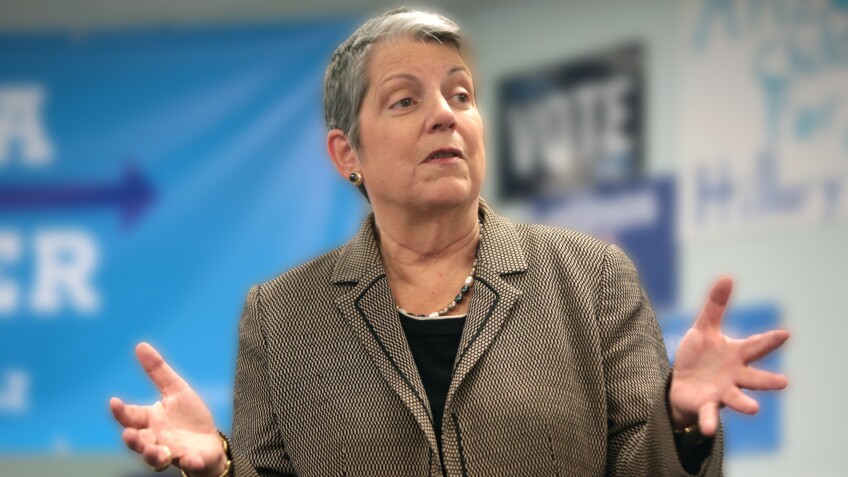How a Trump Presidency May Affect California Policies

Originally posted at CALmatters
As a state bluer than Lake Tahoe in sunlight, California has adopted a slew of progressive policies that drive Donald Trump nuts. They combat climate change, protect undocumented immigrants, evangelize for Obamacare and more.
So this week—as candidate Trump morphed into President-elect Trump—uncertainty swept the state. While protesters hit the streets and the hashtag #Calexit spiked with residents semi-seriously advocating U.S. secession, policy-makers scrambled to identify state programs at risk in the coming Trump administration.
The Legislature’s top leaders, both Democrats, issued a rare joint statement promising to “maximize the time during the presidential transition to defend our accomplishments using every tool at our disposal.”
“We will be reaching out to federal, state and local officials to evaluate how a Trump presidency will potentially impact federal funding of ongoing state programs, job-creating investments reliant on foreign trade, and federal enforcement of laws affecting the rights of people living in our state,” said Senate President Pro Tem Kevin de Leon of Los Angeles and Assembly Speaker Anthony Rendon of Paramount.
The politically savvy were warning not to expect any special favors from the President-elect, given this reception by California. Although some Californians cheered him as an overdue antidote to what they see as their state's foolhardy liberal excesses, voters statewide rejected Trump by a 28-point spread—only Hawaii and Vermont gave him a colder shoulder.
In California, Democrats control the statehouse—powerful Republican politicians are about as endangered a species as the Delta smelt. But with Republicans poised to take control of everything in Washington, here's a look at key things experts say are in jeopardy of being unfunded or undone:

The environment:
On Thursday, Gov. Jerry Brown issued a statement on Trump’s victory, saying Californians “will do our part to find common ground whenever possible" but will also protect the precious rights of our people and continue to confront the existential threat of our time—devastating climate change."
By way of contrast, candidate Trump tweeted and often repeated his view that climate change is a hoax invented by China.
But could the new president unspool many of the state’s signature climate policies?
Trump has reportedly tapped Myron Ebell, a well-known climate skeptic, to lead his Environmental Protection Agency transition team. The agency has a broad portfolio: overseeing federal air and water laws, regulating toxic substances and setting national emissions standards for automobiles and industry. As such, it is frequently in the crosshairs of business interests and Republicans in Congress who perceive it as an overlord issuing onerous regulations.
When California attempted to exercise special authority to regulate tailpipe emissions, it initially tried and failed to get a waiver from the federal EPA to do so under the Bush administration in 2005. Only after President Obama’s election and intervention in the process in 2009 did the EPA grant California its waiver. That episode underscores the fed authority to override state intentions.
It would be a “nightmare scenario” if the Trump administration imposed national rules to override state climate policies, said Ethan Elkind, director of the Climate Program at UC Berkeley School of Law. “Congress could preempt most of California’s climate agenda if they had the political support to do that,” he said. “Once the federal government takes an action on an issue, they could preempt the field.”
The governor seems determined to forge his own path for California—undertaking independent agreements with others states and nations to form carbon trading markets and agree to emissions limits.

Health care:
The Affordable Care Act, or Obamacare, hangs in the balance after the sweeping win on Tuesday by President-elect Donald Trump, who called it "a catastrophe" and promised to kill it immediately. This week GOP leaders continued to cite its repeal as their top priority.
That has big implications for California, a state that enthusiastically embraced the federal expansion and relied on federal dollars to pay for it.
“Can he effectively limit the program as of the first day or early in the administration? Absolutely,” said Gerald Kominski, director of the UCLA Center for Health Policy Research. “He’s not going to be able to have any credibility with his constituents if he starts waffling on day one.”
Kominski said the Trump administration could begin to dismantle the program almost immediately by taking away federal funding for the program through a budgetary process that could gut the program. California receives $20 billion a year through the program—both for subsidies that allow some 1.2 million people to purchase health insurance on the Covered California state exchange, and to fund its expansion of Medi-Cal health care to cover an additional 4 million people who can’t afford to buy health insurance on their own.
Of course Trump hasn’t just promised to repeal Obamacare—he’s vowed to replace it.
But other than extolling the virtues of “the free market,” Trump’s health care plan is vague—there are no details about a complete replacement plan that would provide insurance options for those that would be dumped from the exchange.
Kominski said in California up to 3 million people could lose coverage.

Immigration:
Immigrant advocates are already mobilizing to challenge the promises of President-elect Trump, who vowed to create a deportation force to expel up to 11 million undocumented immigrants.
“Our state has long been a leader in working to protect rights of immigrants in the face of harmful federal policies,” said Cynthia Buiza, executive director of the California Immigrant Policy Center. “Thus we call on Gov. Brown and all of the leaders in our state—and all people of conscience—to demonstrate bold leadership and do everything in their power to protect each and every immigrant who calls our state and our nation home.”
After Trump appointed Kansas Secretary of State Kris Kobach Secretary to his transition team, California Secretary of State Alex Padilla on Thursday released a statement calling it "a deeply troubling message that telegraphs an imminent assault on our collective voting rights and civil rights. His participation is a threat to diverse communities throughout our nation.” He cited Kobach’s support for an Arizona law, found unconstitutional, that would have required police to demand proof of citizenship if they suspected someone of not being a citizen.
Advocates are especially worried about the four-year-old Deferred Action for Childhood Arrivals program, which allows young people brought to the country as children who meet certain requirements to work legally without fear of deportation. It currently protects nearly 800,000 young people—nearly half of them Californians.
President Obama created this program through an executive order. President-elect Trump has promised to “immediately terminate” it.

Education:
California made college accessible and affordable for undocumented immigrants when Gov. Brown signed legislation in 2011 granting them access to in-state tuition and financial aid. Fear that Trump would try to roll that back—not to mention pursuing deportation—coursed through college campuses across the state this week.
Activists insist he can’t touch any protections for immigrants enshrined in state law.
“We feel these protections are sound and will remain in place once Trump takes office,” said Carlos Amador, lead organizer for the California Immigrant Policy Coalition, a nonprofit advocacy group based in Los Angeles. Still, he urged undocumented students to “organize and push back” should any challenges to state law crop up.
Seeking to quell students’ anxiety, University of California President Janet Napolitano released a statement Wednesday with UC’s chancellors pledging to root out intolerance. “In light of yesterday’s election results, we know there is understandable consternation and uncertainty,” Napolitano wrote. But “diversity is central to our mission” and “we remain absolutely committed to supporting all members of our community.”
The economy:
California’s $2.4 trillion economic engine, the sixth-largest largest economy in the world, has outpaced the rest of the nation on multiple fronts: job growth, wages and housing prices. The technology industry continues to flourish and exports are up 31 percent from the recession.
“Any of these three issues, if pursued vigorously, has the potential to cause a recession,” writes Christopher Thornberg
But Beacon Economics released a report Thursday warning that Trump’s pledge to slash taxes would widen the federal deficit; bowing out of U.S. commitments to free trade would disrupt supply chains and drive up consumer prices; and deporting millions of immigrants without legal documents would cause massive disruption, let alone trigger a “human tragedy.”
“Any of these three issues, if pursued vigorously, has the potential to cause a recession,” writes Christopher Thornberg, one of the authors.
California business interests are gearing up to protect the Trans-Pacific Partnership, an agreement among 12 Pacific Rim countries to expand trade. The deal is touted by supporters for boosting sales of everything from laptops to almonds, and adding jobs in a state that already exports $71.6 billion of goods to those partner countries.
Peter Leroe-Munoz, vice president of technology and innovations at the Silicon Valley Leadership Group, said trade-related jobs pay 15 to 18 percent higher than workers whose companies only sell domestically. “As Silicon Valley adjusts to the new political reality, we’re still hopeful,” he said. “We’re working to make sure President-elect Trump has the full picture of the innovation economy. … We’re fully aware this is going to be a big political lift.”
Reported by Elizabeth Aguilera, Jessica Calefati, Julie Cart, Judy Lin and Matt Levin of CALmatters.org—a nonprofit news venture devoted to covering state policy and politics. Click herefor the longer version of this article.


